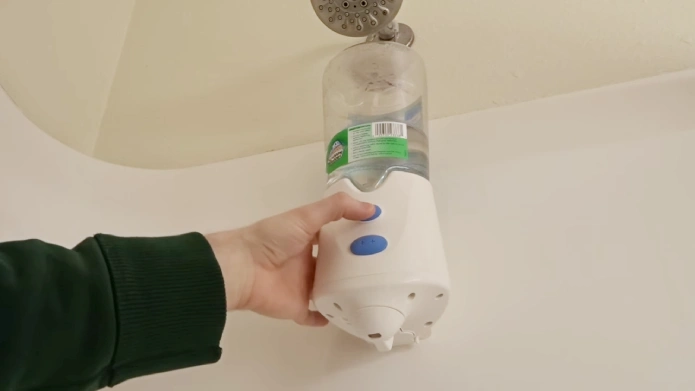Last Updated on November 14, 2023
Are you looking for an alternative to Scrubbing Bubbles Automatic Shower Cleaner? If so, you are not alone. Despite its popularity, there is a good reason why Scrubbing Bubbles automatic shower cleaners are discontinued.
It turns out that the chemical compounds found in Scrubbing Bubbles automatic shower cleaners can be hazardous when used in large amounts or for extended periods. Short-term use of this cleaner can lead to serious health issues such as narcosis, pulmonary edema, and severe damage to the liver and kidneys.
Also, it has been known to cause discoloration on some plastics, and clogged shower drains, leading to standing water at the bottom of the shower. If you’re concerned about using a chemical-based cleaner around your home, natural alternatives are available that don’t come with these risks.
Let’s look in depth at Scrubbing Bubbles and natural cleaners.
Some Natural Alternatives to Scrubbing Bubbles Automatic Shower Cleaner
With the rising trend of eco-friendly and sustainable products, many are searching for natural cleaning solutions that are better for their health and the environment. There are a few alternatives to Scrubbing Bubbles cleaners that don’t use harsh chemicals. Here are some of them:
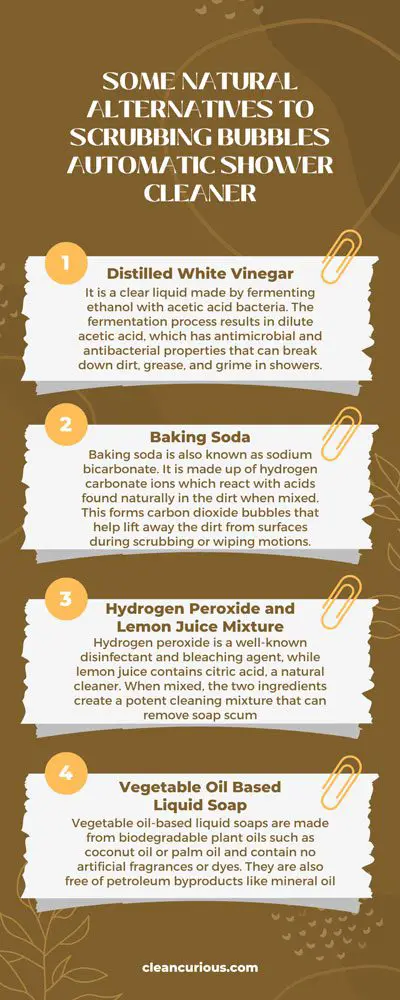
Number 01: Distilled White Vinegar
It is a clear liquid made by fermenting ethanol with acetic acid bacteria. The fermentation process results in dilute acetic acid, which has antimicrobial and antibacterial properties that can break down dirt, grease, and grime in showers.
To use it effectively in your shower, mix one distilled white vinegar with one part water in a spray bottle. Spray it directly onto the surfaces of your shower and let it sit for 10 to 15 minutes before wiping it away with a wet cloth or sponge. This method should be done regularly to ensure you get rid of any dirt, soap scum, and mildew buildup.
Pros: One of the main advantages of using distilled white vinegar as a cleaner for your shower is that it is non-toxic and safe for use around people and pets. In addition to being an effective cleaner, its acidic properties help quickly break down stains on tiles and floors.
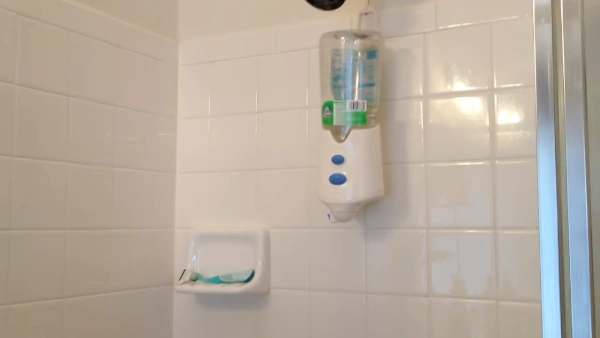
Cons: Leaving it on surfaces too long or not diluting it enough before using it can also damage surfaces. Due to its high acidity, its scent can be overpowering, so ventilation should be kept in mind if using it regularly.
Number 02: Baking Soda
Baking soda is also known as sodium bicarbonate. It is made up of hydrogen carbonate ions which react with acids found naturally in the dirt when mixed. This forms carbon dioxide bubbles that help lift away the dirt from surfaces during scrubbing or wiping motions.
To use baking soda effectively for cleaning showers, mix two tablespoons of baking soda with one cup of warm water until completely dissolved, making sure not to inhale any powder particles during the process (to avoid inhalation hazards).
Then apply this paste to your shower surfaces using a damp cloth or sponge before scrubbing lightly along walls or floors, depending on where you need cleaning most urgently.
Afterward, rinse off thoroughly with warm water before drying off with a dry towel leaving behind no residue whatsoever thanks to baking soda’s neutral pH level balance.
Pros: Unlike store-bought alternatives, baking soda is cheap and easy to find at most retailers without buying specialty items. Due to its non-abrasive texture, it’s safe even on more delicate surfaces like porcelain tubs and marble floors where chemical cleaners would otherwise etch over time.
Cons: The smell may be slightly unpleasant while using baking soda, although this shouldn’t last long after rinsing off properly afterward. When used frequently, baking soda’s mild abrasive nature could cause damage over time, especially to softer materials like chrome fixtures in showers.
Number 03: Hydrogen Peroxide and Lemon Juice Mixture
Hydrogen peroxide is a well-known disinfectant and bleaching agent, while lemon juice contains citric acid, a natural cleaner. When mixed, the two ingredients create a potent cleaning mixture that can remove soap scum, mildew, and other dirt from shower surfaces.
Using this mixture in the shower is pretty straightforward. To make the solution, dilute one cup of hydrogen peroxide with one cup of water in a spray bottle. Then add two tablespoons of fresh lemon juice to the mix before shaking well.
Spray this solution on all the affected areas in your shower, including walls, floor, showerhead, faucets, etc. Let it sit for 10 minutes, then use a scrub brush or cloth to loosen up any dirt or grime before finally rinsing everything off with warm water.
Pros: Advantages of using hydrogen peroxide and lemon juice instead of Scrubbing Bubbles automatic shower cleaners include saving money because these items are less expensive, as well as being non-toxic. Most commercial cleaners are not non-toxic.
And since hydrogen peroxide and lemon juice are both natural cleaners, they will not cause any damage to the environment or pose health risks to those using them.
Cons: Users should always wear protective gloves when handling these mixtures, as both products can irritate if they come into contact with the eyes or skin. Also, keep these mixtures away from children since their skin is more sensitive than adults.
Make sure you never combine hydrogen peroxide with bleach because doing so can create dangerous chlorine gas fumes, which can lead to breathing difficulties and even death if inhaled over long periods of time.
Number 04: Vegetable Oil Based Liquid Soap
Vegetable oil-based liquid soaps are made from biodegradable plant oils such as coconut oil or palm oil and contain no artificial fragrances or dyes. They are also free of petroleum byproducts like mineral oil which can be found in many commercial cleaners.
To use vegetable-based liquid soap correctly, one should first fill up a spray bottle with warm water, then add about ¼ cup of vegetable oil-based liquid soap diluted with ¼ cup of cold water before shaking until fully combined.
Next, spray this mixture onto all affected areas in your bathroom, including walls, floors, showerheads, faucets, etc. Scrub the dirt after letting this sit for 10 minutes, then rinse everything with warm water.
Pros: One advantage vegetable oil-based liquid soap has over other cleaning solutions is that it creates very little foam when used compared to traditional soaps or detergents. This means less rinsing is required afterward, saving both time and water.
They are more eco-friendly alternatives overall than synthetic soaps used in commercial cleaning products like Scrubbing Bubbles automatic shower cleaners.
Cons: These byproducts have been linked to causing health issues such as skin irritation and hormone disruption. People who may have allergies should test this product on their skin first before trying it out on larger surfaces. The product has plant oils, which could cause an allergic reaction.
What Chemicals Are In Scrubbing Bubbles Shower Cleaner?
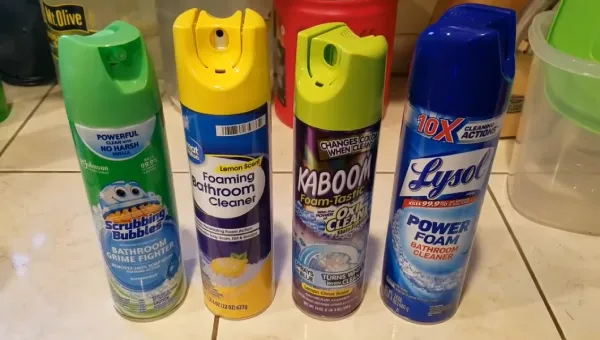
Scrubbing Bubbles is a cleaning product that contains several active ingredients, including alkyl dimethyl amine oxide, 1-(1-tert-Butoxypropan-2-yloxy)propan-2-ol, 1-(1-propoxypropan-2-yloxy)propan-2-ol., ethoxylated alcohol, and lactic acid.
Alkyl dimethyl amine oxide is an amphoteric surfactant that helps to loosen dirt particles so they can be removed easily. 1-(1-tert-Butoxypropan-2-yloxy)propan-2-ol and 1-(1-propoxypropan-2-yloxy)propan-2-ol. are both agents used to help remove soap scum.
Ethoxylated alcohol assists in removing dirt and deposits, while lactic acid helps to remove hard water deposits and adjust the pH balance of the product. All of these ingredients help to make Scrubbing Bubbles an effective cleaner for tough bathroom surfaces like tile and glass shower doors.
What Makes Scrubbing Bubbles Hazardous?
Scrubbing Bubbles is a hazardous product due to its formulation, which contains gases under pressure that can explode if heated. It is also categorized as Category 2B, which means it can cause serious eye irritation, so it should always be used with caution.
When using this product, it’s essential to wear safety glasses and gloves to protect your eyes and skin from contact with the active ingredients. Also, the container should never be exposed to temperatures over 120°F (49°C) as this could cause an explosion.
If inhaled, the fumes may irritate your lungs, so you should use this product in a well-ventilated area or outdoors when possible.
Keep Your Shower Clean Without Compromising Your Health
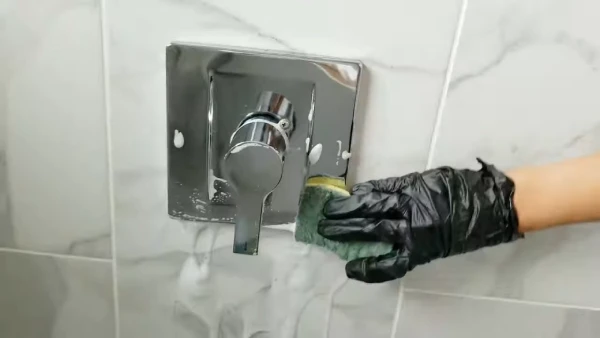
Although Scrubbing Bubbles automatic shower cleaner was once popular, it has since been discontinued due to its potential adverse health effects when used in large quantities or over long periods.
Luckily, plenty of safer alternatives are available today if you’re looking for a more natural way to clean your shower without compromising results. With these options available, everyone can clean their bathroom safely and effectively without worrying about negative health consequences.
So next time you reach for a cleaner for your shower, be sure to do your research first and choose one that is better for you and the planet.

